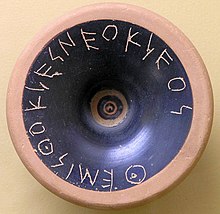The examples and perspective in this article may not represent a worldwide view of the subject. (August 2017) |

A quorum is the minimum number of members of a group necessary to constitute the group at a meeting.[2] In a deliberative assembly (a body that uses parliamentary procedure, such as a legislature), a quorum is necessary to conduct the business of that group. In contrast, a plenum is a meeting of the full (or rarely nearly full) body. A body, or a meeting or vote of it, is quorate if a quorum is present (or casts valid votes).
The term quorum is from a Middle English wording of the commission formerly issued to justices of the peace, derived from Latin quorum, "of whom", genitive plural of qui, "who".[3] As a result, quora as plural of quorum is not a grammatically well-formed Latin-language construction. In modern times a quorum might be defined as the minimum number of voters needed for a valid election.
Quorums are often required by traditional handbooks of parliamentary procedure such as Robert's Rules of Order.[4] However, quorums have been criticized by social choice theorists for their pathological behavior, including an absurd result called a no-show paradox, where a proposal may pass because too many members oppose it.[5] This has led many jurisdictions and bodies to replace traditional quorums with quorums of votes in favor, i.e. a requirement that any proposal be supported by a certain share of the entire membership to pass (e.g. 25% of all members).[5]
- ^ Sinclair, R. K. (1988). Democracy and Participation in Athens. Cambridge University Press. pp. 114–9. ISBN 0521423899.
- ^ "Definition of QUORUM". www.merriam-webster.com. 23 November 2023. Retrieved 5 December 2023.
- ^ "Quorum Archived 23 November 2016 at the Wayback Machine," Merriam-Webster's Online Dictionary, 11th Edition.
- ^ Robert, Henry M.; et al. (2011). Robert's Rules of Order Newly Revised (11th ed.). Philadelphia, PA: Da Capo Press. p. 21. ISBN 978-0-306-82020-5. Archived from the original on 13 August 2017.
- ^ a b Aguiar-Conraria, Luís; Magalhães, Pedro C. (19 September 2009). "Referendum design, quorum rules and turnout". Public Choice. 144 (1–2): 63–81. doi:10.1007/s11127-009-9504-1. ISSN 0048-5829.